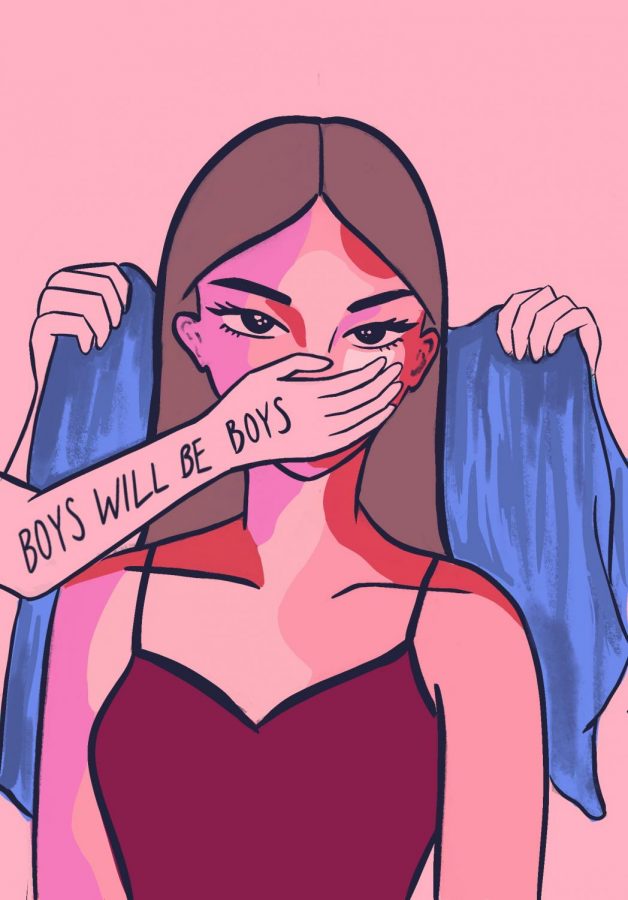The Trials and Tribulations of the Female Student Experience
Recently, several female students have taken to social media to speak out about their own experiences with male students who have made them feel uncomfortable on and off campus. A strange feeling had come over me upon reading these posts and reading these stories for myself. They were profoundly personal, but also irrevocably relatable. As if I’d been shaken from a hypnosis brought on by the subliminal notion that girls cannot do anything other than keep their head down and try to ignore whenever a male student says or does something that feels wrong or violating, the strength displayed by my outspoken peers opened my eyes the pervasiveness of sexual harassment faced by female students.
For some reason, being vocal about certain instances in which male peers have crossed the line had never seemed like an option to me. But, whether its having the perspective of a senior on her way out, the recent abduction and murder of 33-year-old Sarah Everard, or the posts by other students breaking their silence, I cannot continue to compartmentalize and suppress every instance that made me feel uncomfortable, violated, or afraid.
When the male students who sat next to me in class went out of their way to consistently comment on my choice of clothing, how certain shirts or skirts or dresses looked on me, and about the areas of skin left uncovered, I was dumbfounded each and every time. Looking back, I wish I had responded with something that had more zing than “Shut up” or “Stop.” So rather than get angry or cry or speak to someone, I tried to change my own behaviors to avoid these distressing conversations—however, whether I wore a sweatshirt or shorts and a tank top, the unwelcome commentary persisted, always by the same select offenders. Even if I begged my mom to schedule an appointment during the class periods where most of these students were so I could have a day of peace, the wolves were always waiting for my return to tear me apart.
Too many other girls share this very story—experiencing this kind of scrutiny and dehumanization is not only incredibly demeaning and defeating, but also makes it impossible for me to ultimately feel safe on campus. I stopped listening to the lectures of my teacher, as I could hardly hear over the snickering and hurtful words of the boys seated around me. After a semester of weathering my weekly shaming, I stopped paying attention in class on the days I was trapped with the commentators and my test scores suffered for it. I’ve opted not to return to the classroom where I’d experienced this sort of discomfort since the final day of class.
I’m tired of downplaying how helpless and frustrated I felt during that period of time. My feelings were real, as are the emotions and experiences of hundreds of other girls on campus.
A public service announcement to the boys who have said things about what a girl is wearing or her appearance in general: it’s not peak comedy to talk about women’s bodies right in front of them, nor is it a compliment when said in a manner that is brazenly inappropriate and uncalled for. And when we laugh or smile at the unsettling remarks you make, it’s because we are uncomfortable and have no idea how to respond.
If you’re not totally sure if you crossed the line in your comments at some time or another, you probably did; there are boundaries that need to be respected with female friends too, so don’t be afraid to ask where they are. And if you’ve crossed the line, don’t do it again.
The kind of inappropriate behavior that girls experience can range from entirely verbal harassment to physical. In an interview, a senior girl who will remain anonymous—I will refer to her as Mary—recounted a time when she was once groped by a male student in P.E. during her freshman year. “I instantly pushed him away from me and just stood there for a moment in utter shock. I knew I wasn’t going to let him get away with it, so I took one of my friends and went to the office. I told the vice principal what had occurred and filled out an entire statement form and whatnot. Honestly, the whole time I was zoned out and just going through the motions,” Mary said.
Upon investigating Mary’s assault further, 1 of Mary’s friends, who was in the same P.E. class at the time, told me that she remembered her discomfort when this event took place. Remaining anonymous to protect her own identity and Mary’s, the senior girl said, “I remember [Mary] talking to the group of girls we had formed in the class and saying how uncomfortable the incident made her feel and how it continued to linger with her whenever she would see him in the halls or anywhere else. I agreed with her and had the same feeling, as I’m pretty sure many other girls did as well.”
In addition to physically violating Mary, the male student would also make sexual innuendos and other remarks that made Mary and others feel incredibly uncomfortable being in the same class as him. The perpetrator—who reportedly no longer attends Campolindo—made similar assaults on other female students throughout the year, 1 of which filed a police report that required Mary and other victims to go into the police department to make a statement. “I knew what I was doing was the right thing, but each time I had to retell the story to an adult, it felt more and more like someone else’s words in my mouth, I couldn’t believe this had happened to me on school campus in a place where I’m supposed to feel completely safe,” Mary said.
“Even today, though he no longer goes to this school, seeing him out in public makes me feel incredibly uncomfortable and I want to be nowhere near him,” added Mary’s friend.
According to a 2020 survey conducted by the Women’s Awareness on Campus (WAC) club, 71.4% of the female student participants reported having received “unwanted sexual comments, jokes, etc. on campus.”
Only 5.7% of these surveyed students believe that Campolindo has done enough to educate its students on sexual assault and harassment. To clarify, there’s no specific thing the administration did to create an environment where this culture exists—however providing female students with more safe spaces, starting hard conversations, and using education to combat this issue is a necessary place to start.
The patterned sexualization and harassment of teenage girls on campus is far from the monolith of physical assault. In contrast to pre-social media times, student dynamics have taken on an entirely new subcategory of interaction with the prevalence of online platforms like Instagram, Snapchat, and more. Many, if not all, students utilize these apps to remain in contact with friends and acquaintances alike. These apps simply are the direction in which the dating culture of our generation is going, however, Snapchat is also a place where harassment and unwanted advances can follow female students back home, long after the school bell rings.
In an interview with The Claw, a senior girl who I will refer to as Anna spoke about how she—like far too many of us—has been harassed on Snapchat by male students “too many times to count.” The perpetrators will make crude statements, ask repeatedly to hang out, and solicit inappropriate photos, amongst other things, growing bolder each time Anna denied them or chose not to respond.
“Just about everything someone could say to you to make you feel uncomfortable, I’ve heard. I just never know how to respond. And they don’t take no for an answer,” said Anna.
No means no. It seems like such a simple, easy to understand rule but it is unfortunately largely ignored. If said in a text conversation, on any social platform, on FaceTime, over voice call, and in person, no has and will always mean no. In fact, anything but a firm yes means no, and that very yes can expire at any time. Coercing a girl into going out with you or sending a nude photo after she repeatedly has vehemently expressed her discomfort is a reflection of the offender’s blatant disregard for human decency and respect.
Although it can sometimes be hard on social media to truly gauge what another person is truly thinking, there is a massive difference between seeking clarification and being forcefully persistent in your demands.
Unlike in school, on social media, girls can block or un-add a person the moment they no longer feel safe remaining in contact. However, this often results in the blocked party simply moving onto the next girl. Or finding a new social media platform to continue their harassment.
We can block people, go to the administration or the police, and change our clothes, yet there will always be the male students who slip through the cracks and believe creeping out women is a pastime to take pride in. Rather than feed into the cycle of not holding male students accountable, these behaviors need to be reformed entirely. It’s unfortunate that most boys do not learn these boundaries as children, but Campolindo needs to pick up the slack.
This sort of problematic behavior and male mindset needs to be nipped in the bud before situations of poor online conduct or in-person harassment continue. The education and safety of female students should matter to our teachers, administrators, and fellow peers. The burden to find a solution to these all-too-common experiences should not fall onto female students, who can at times be treated without respect or human dignity by their male counterparts—the administration must take steps to address the brazenly inappropriate behavior of boys rather than depend on the continued complacency of Campo’s young women to maintain a fragile peace.
In case some people don’t know this, you can talk to girls without being creepy, making border-line sexual insinuations, and harassing them online.
Enforcing a dress code, moving seats in class, or ignoring texts and comments are not real solutions. But instead of units in Academy Cohorts condemning unacceptable student conduct or stressing the importance of consent, the darkside to the experience of a female high school student has been swept so far under the rug that we have forgotten it’s there at all.
By having such limited safeguards on campus to lobby on behalf of these interests, the school sends the subliminal message that it’s young women who need to go the extra mile to ensure their own safety by placating male aggression with submission, baggy sweatshirts, and long-suffered silence. Our school must instruct young men not to act inappropriately in the 1st place. We seldom get an apology, nevermind the recognition and support of school-wide efforts to address our plight.
Obviously, male students can be harassed by other male students in similar manners, and female students can make their male peers feel uncomfortable—harassment is unacceptable period. But the fact I could walk up to any random girl at Campolindo and she would probably have her own story about harassment on campus or online (or both) suggests a seriously deep-rooted issue in school culture.
To the students who believe themselves to be the select “good guys” on campus who respect women in the slightest: the bar may be low enough as it is, but being a bystander doesn’t cut it. For your information, it’s cool to respect women. Hold your friends accountable when they say something that’s not okay—whether to a female student or with their friends in private.
And if you as a guy have a hard time believing that this is a systemic issue for the women in your life or at your school, know that victims in this society are often blamed long before the offender; victims also have the added burden of going above and beyond to prove their harassment only to be not believed anyways. These patterns have been ingrained into us by a society where we are cat-called, raped, abducted, stalked, and murdered, so forgive us if we don’t feel comfortable arguing with you about whether or not an instance of harassment even exists.
Boys will be boys, goes the profoundly dismissive and misogynistic rhetoric of generations past. Boys and men alike value consent, boundaries, and women. Boys will listen to survivors and victims rather than dismiss them with rape jokes and sexist language. Boys will support their female peers, act decently, and be held accountable. Boys will be decent human beings, and that is the absolutely mandatory bare minimum for the starting point of progress.
Your donation will support the student journalists of Campolindo High School's The Claw. Your contribution will allow us to produce more issues and cover our annual website hosting costs.

Senior Nicole Kennedy has played volleyball for 8 years and is currently on Campolindo's varsity team. She also played club volleyball at Red Rock East...

Senior Ashley Xu has been interested in art since she was in the 3rd grade.
Xu is fascinated by iconic painters like Monet and Dali. “I like Monet’s...





Randall Whitney • Apr 27, 2021 at 11:23 pm
award worthy. your pen will make change happen.
nice work and I hope to carry this torch further up the mountain.